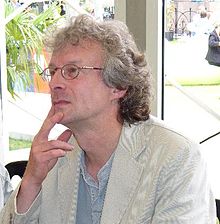
Andrew Drummond is a Scottish writer, translator and novelist. He was born in Edinburgh and studied at the University of Aberdeen and the University of London. Previously employed full-time as a software engineer, he now pursues his writing full-time.
Contents
He is the author of five novels: An Abridged History of the Construction of a Railway Line Between Ullapool and Lochinver [1] [2] (2004); A Hand-book of Volapük (2006) [3] set in 1890s Scotland; Elephantina (2008); Novgorod the Great (2010); and The Books of the Incarceration of the Lady Grange (2016). He has also written several short stories and some nonfiction translations from German. More recently, he has written a biography of the 18th century adventurer Maurice Benyovszky, entitled The Intriguing Life and Ignominious Death of Maurice Benyovszky (2017), and an account of the attempts to extend rail connections to the north-west Highlands of Scotland, A Quite Impossible Proposal: How Not to Build a Railway (2020). In 2024, his biography of the 16th century German radical preacher Thomas Müntzer was published, entitled The Dreadful History and Judgement of God on Thomas Müntzer: The Life and Times of an Early German Revolutionary.